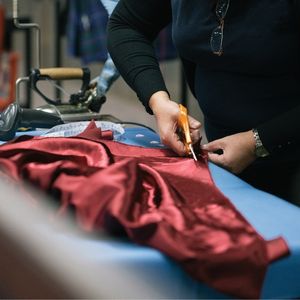Scottish circular fashion hub reduces emissions by 90% and nets £10m green investment
Scottish circular fashion hub reduces emissions by 90% and nets £10m green investment
Background
Motherwell-based Advanced Clothing Solutions (ACS) specialises in supporting retailers to embrace the circular economy by offering services to support the resale of used items, such as refurbishment and cleaning, photography, storage and shipping. It counts major brands such as eBay among its customers.
As part of a drive to achieve net-zero emissions in 2023 and make itself more attractive to green investors, it conducted a carbon accounting exercise with the help of the National Manufacturing Institute Scotland (NMIS).
Customer Challenge
The global clothing industry is estimated to be responsible for over 1.2 billion tonnes of CO2 each year. Aiming to lead by example and enhance its own sustainable credentials, ACS was seeking to implement effective emission reduction strategies, however due to a lack of data it couldn’t quantify the current environmental impact of its processes and materials.
What did NMIS do?
The NMIS SME Engagement team worked with ACS to develop a clear pathway to achieving net-zero with support from the Scottish Institute for Remanufacturing’s EXTEND project, aimed at helping growing businesses to reuse, repair and recondition existing assets, funded by the European Regional Development Fund through the Low Carbon Challenge Fund (LCCF).
First, NMIS explored data related to ACS Clothing’s processes, consumable materials and other business-related activities. After analysing factors such as materials usage and storage and how colleagues travel to work, each element was categorised according to the greenhouse gas (GHG) protocol.
Achievable and affordable low-emission solutions were provided, including adopting different materials, switching to electric vehicles, reducing personnel commuting, and developing closed-loop waste management systems with suppliers. All recommendations were made in line with ACS’s budget and available resources.

Sustainability and the circular economy are central to ACS’s core identity. Through help from the National Manufacturing Institute Scotland (NMIS) we have implemented real solutions that will have a tangible impact on how we operate. This approach has already driven results by helping us secure investment to keep us growing. Our relationship with NMIS also given us a larger voice within the industry – helping us to influence policy and others in the textiles industry to become more sustainable.
Michael Cusack, Head of Sustainability, ACS
Business Impact
It’s expected that ACS can reduce its environmental impact by 90%, reaching its ambitious net-zero goal. The project has also improved the company’s value and made it more attractive to ethical-green investors, resulting in £10m from Circularity Capital, which will be used to accelerate further growth in the resale markets across Europe by developing a new UK based facility and creating more jobs to allow increased capacity.
